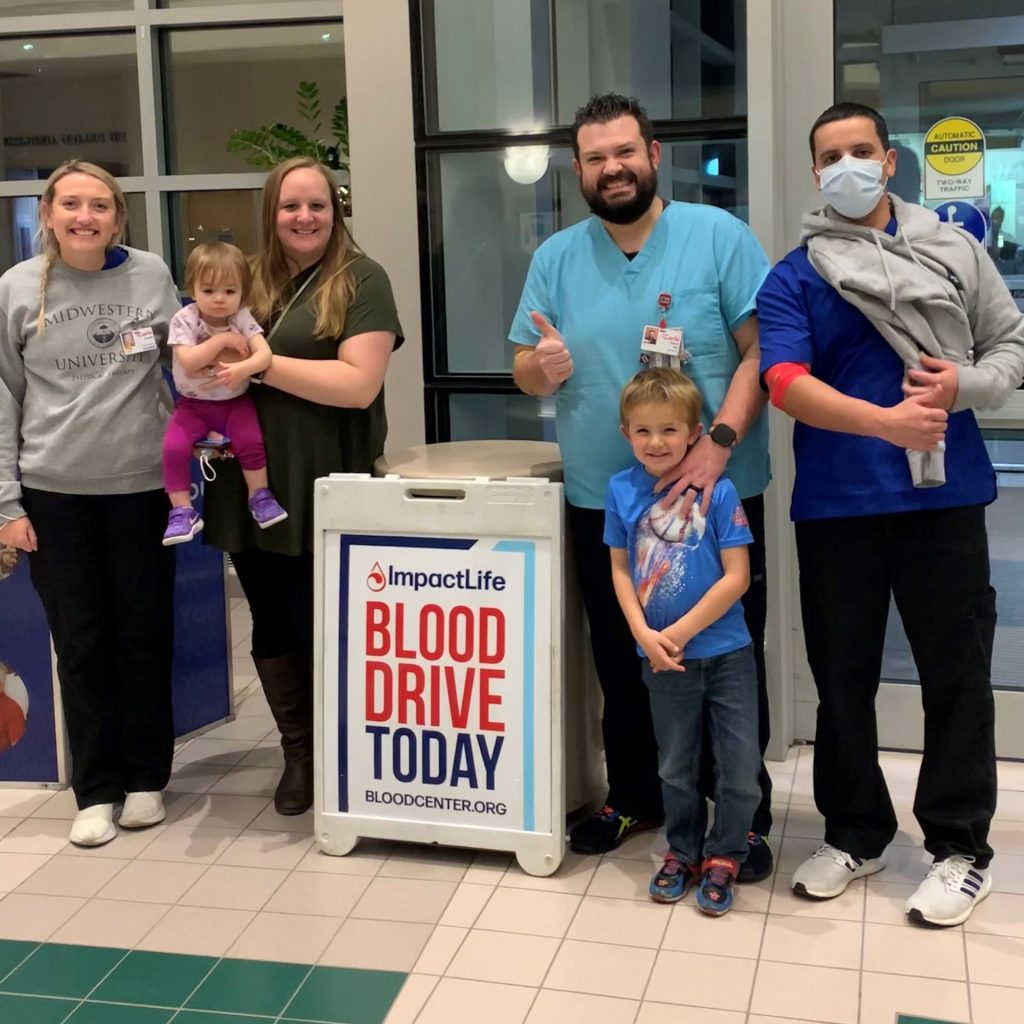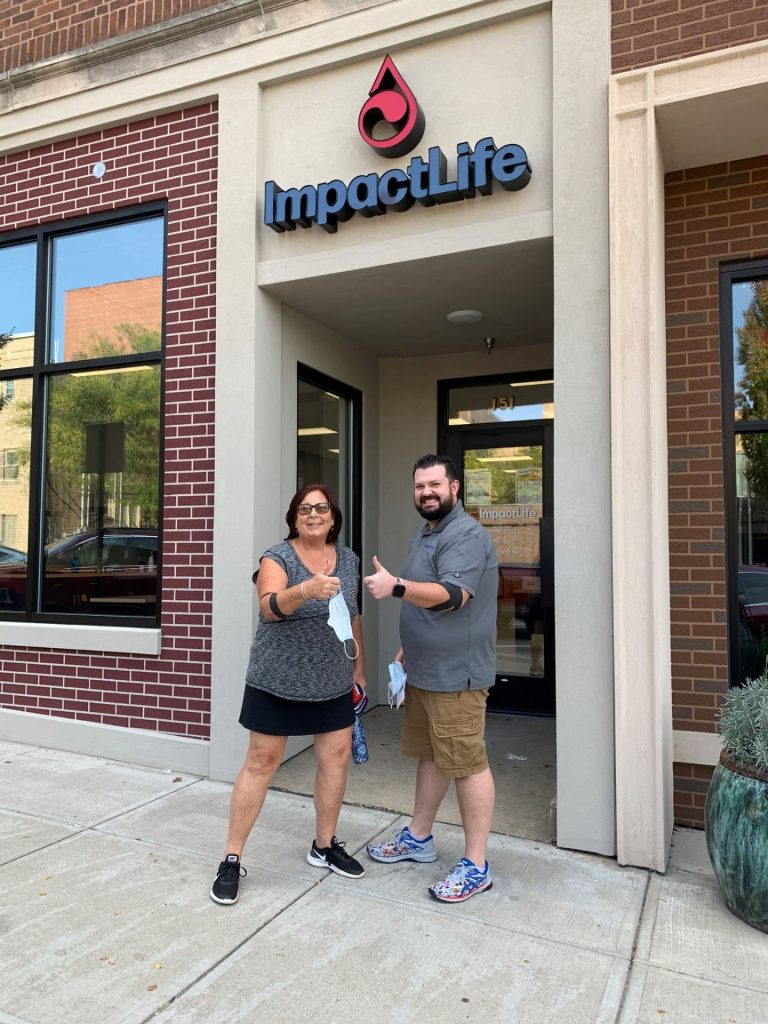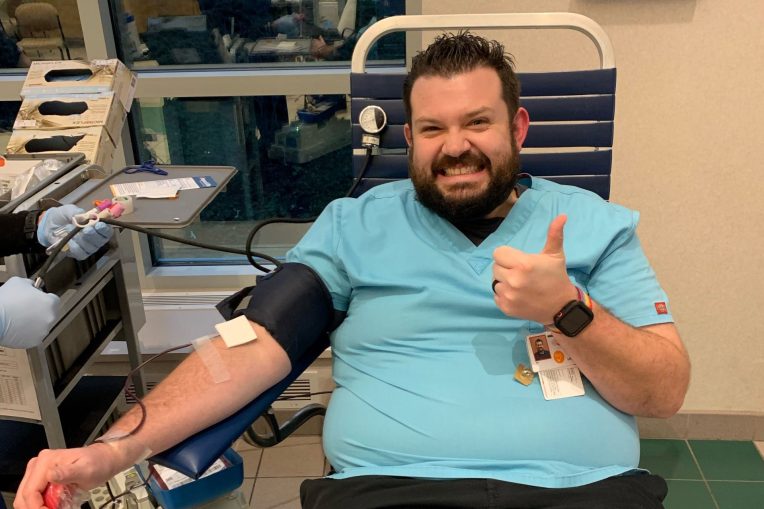When Eddie Gordon ’12, ’17 isn’t on the job as a medical lab scientist for Carle Foundation Hospital’s blood bank in Urbana, he’s often either organizing a local blood drive, promoting the importance of blood donations, or donating blood himself.
For Gordon, giving blood—a liquid essential to life—is personal.

In May of 2019, Gordon’s father, Dennis Gordon, was diagnosed with leukemia, and he began receiving blood and platelet transfusions while undergoing cancer treatments. Dennis’ health took a turn for the worse in February of 2020 as he experienced organ failure which required doctors to administer dozens of units of blood products until, ultimately, he passed away.
“He didn’t make it. But without donors providing those blood products in the first place, we wouldn’t have gotten that time with him to say our goodbyes; to hold on to him long enough to get the family to come up; to let my son say goodbye to him,” Gordon said.
To honor his late father, Gordon vowed to become a frequent blood donor. His sister, Lizzy Gordon ’16, his mother, Linda (Knotek) Gordon ’81, and his wife, Courtney (Olson) Gordon ’14, made the same commitment.
“I thought, ‘I need to give back and do what I can to maybe let somebody else have that time with their loved one like I was able to have with my dad,’” Gordon said. “When you give blood, it’s just a time to reflect and know that you’re making a positive impact. And we’re doing it in my dad’s memory.”
Last November, Gordon’s cumulative blood donations surpassed the 2-gallon mark. He gives the maximum—either every eight weeks for whole blood donations or every 16 weeks for double red cell donations. Through his role as an associate board member for ImpactLife, a nonprofit community blood center, Gordon is encouraging others to become regular donors too. Each whole blood donation has the potential to save up to three lives.
“We can’t synthesize blood yet—it’s not an option. So, if we don’t have any donors who are coming out to donate, those blood products aren’t going to be there, which so many people rely on.”
Eddie Gordon
“I always say, ‘The little prick of the needle is miniscule compared to the feeling that you’re going to have knowing that you’re helping someone in your community,’” Gordon said. “We can’t synthesize blood yet—it’s not an option. So, if we don’t have any donors who are coming out to donate, those blood products aren’t going to be there, which so many people rely on.”
Gordon experiences the need for blood products daily in his role as a medical lab scientist for Carle’s blood bank. In a typical day, he conducts blood tests and prepares donated blood for scheduled and emergency procedures that require transfusions. He also readies blood for cancer treatments.

“I truly believe, when I go into work every day, that I’m in the career that I’m supposed to be in,” Gordon said. “It’s something that I care a lot about.”
After earning a bachelor’s degree in biological science from Illinois State—where he met his future wife, Courtney, a graduate of the health informatics and management program—Gordon started his career as a laboratory technician at Archer Daniels Midland in Decatur.
Although he enjoyed the work, Gordon felt compelled to pursue a role in the medical field. He returned to Illinois State where he earned a second bachelor’s degree in medical laboratory science.
“I’ve always loved the sciences,” Gordon said. “I knew working in a lab was going to be fun, and then when you get to tie in the desire to help people—but not really wanting to be directly next to that patient like a doctor or nurse—you still get that same sort of, ‘Hey, I’m making a difference’ feeling.”
Gordon credited Dr. Beverly Barham, a professor in the medical laboratory science program, for teaching him about and preparing him for a fulfilling profession in blood banking.
“I definitely believe that she is a very big key as to why I am so passionate about blood banking,” Gordon said. He now enjoys working with students who intern at the blood bank, and he hopes for a continuous stream of future medical lab scientists from Illinois State’s Department of Health Sciences.
“It’s a rewarding career,” Gordon said. “And even if you don’t have that ability in your day-to-day job, at least you know once every eight weeks you can make a difference by donating blood. It’ll make you feel good, because you’ll know that your blood is going to somebody who needs it.”
January is National Blood Donor Month. Illinois State students, faculty, and staff have the opportunity to donate blood on campus regularly including during two upcoming ImpactLife blood drives on Tuesday, January 31 and Monday, February 6.

